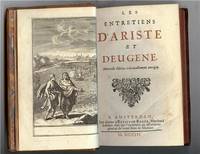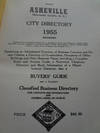
Les Entretiens D'Ariste et D'Eugene- 1703, First Edition
by Dominique Bouhours
- Used
- Fine
- first
- Condition
- Fine/none present
- Seller
-
Swampscott, Massachusetts, United States
Payment Methods Accepted
About This Item
Bouhours, Dominique. (1628-1702) Les Entretiens D'Ariste Et E'Eugene. Nouvelle Edition très-exactement corrigée. A Amsterdam, Aux depens D'Estienne Roger, Marchand Libraire chez qui l'on trouve un assortiment general de toute sorte de Musique. M. DCCIII (1703)
Duodecimo. [3 blank], [3 verso,scene], [title page] A12-I12, K12-R12 [R12 includes 4 blank]. Bookplate of Nicolai Joseph Foucault 'Comitis Consistoriani' Two Lions holding a crowned lion within the Crown. French Calf, with marvelous gold filigree Emblem on the front and back of the same lion. Five raised spines in period gold gilt. Some edge and binding abrasion but otherwise tight. Internally clean but with fading print, probably not washed but just running out of ink.
Title Page Printed in Red and Black by Roger in Amsterdam in 1703, the year after Dominque Bouhours death, this elegantly bound book was once owned by Nicolai Joseph Foucault and has his wonderful bookplate as well as his deeply embossed Seal on the front and back of the book. Period blind stamp binding with 6 wonderful compartments. There is some minor separation of the leather along the spine but that is easily repaired. The book is tight, crisp and is in overall very good condition. Dominique Bouhours (15 May 1628 - 27 May 1702) was a French Jesuit priest, essayist and neo-classical critic. He was born and died in Paris. Bouhours entered the Society of Jesus at the age of sixteen, and was appointed to read lectures on literature in the Collège de Clermont at Paris, and on rhetoric at Tours and Rouen. He afterwards became private tutor to the two sons of Henri II d'Orléans, duc de Longueville. First Amsterdam Edition. He was sent to Dunkirk to the Romanist refugees from the Commonwealth of England, and in the midst of his missionary occupations published several books. In 1665 or 1666 he returned to Paris, and published in 1671 Les Entretiens d'Ariste et d'Eugène, which was reprinted four more times at Paris, twice at Grenoble, and afterwards at Lyon, Brussels, Amsterdam, Leiden and other cities. The work consists of six conversations (entretiens) between two companionable friends whose Greek- and Latin-derived names both mean "well-born", in the agreeable discursive manner of the well-informed amateur as it had become established in the salons— "the free and familiar conversations that well-bred people have (honnêtes gens, a by-word of the précieuses of the salons) when they are friends, and which do not fail to be witty, and even knowledgeable, though one never dreams there of making wit show, and study has no part in it."[1] The subjects, erudite but devoid of pedantry, are the Sea, considered as an object of contemplation, the French language, Secrets, True Wit ("Le Bel Esprit"), The Ineffable ("Le Je ne sais quoi") and Mottoes ("Devises"), all expressed in flawless idiom and effortless allusions to the Classics or Torquato Tasso. The popularity of Bouhours' discursive, heuristic Entretiens extended to Poland, where Stanislaw Herakliusz Lubomirski imitated them in Dialogues of Artakses and Ewander. His thoughts on the elusive je ne sais quoi that was in vogue in the seventeenth century, expressed through his characters, ends in assessing it a mystery that escapes a rational inquiry. It determined by its delicate presence, its grace and invisible charm, the sense of what pleases or displeases in Nature as well as Art, and remained an essential part of the French critical vocabulary until the advent of Romanticism.[2] His Doutes sur la langue française proposés aux Messieurs le l'Académie française (Paris, 1674; corrected second edition, 1675) was called "the most important and best organized of his numerous commentaries on the literary language of his time"[3] when it was edited in a critical edition. His doubts are collected under five headings: vocabulary, phrases and collocations, grammatical constructions, clarity, and stylistic consistency, in each case setting literary quotations under scrutiny. His standards, expressed in the suggestions he offered for improving each example, showed the way out of ambiguities, skirting incongruous juxtapositions and untidy constructions. The work was widely accepted and Bouhours standards are still the accepted norm among literate readers today. The chief of his other works are La Manière de bien penser sur les ouvrages d'esprit (1687), which appeared in London in 1705 under the title, The Art of Criticism, Vie de Saint Ignace de Loyola (1679), Vie de Saint François Xavier (1682),[4] and a translation of the New Testament into French (1697). His letters against the Jansenists had a wide circulation. His practice of publishing secular books and works of devotion alternately led to the mot, qu'il servait le monde et le ciel par semestre. Bouhours died at Paris in 1702. According to the book Mother Tongue by Bill Bryson, Bouhours' dying words were "I am about to -- or I am going to -- die: either expression is used."Reviews
(Log in or Create an Account first!)
Details
- Bookseller
- Calix Books
(US)
- Bookseller's Inventory #
- biblio45
- Title
- Les Entretiens D'Ariste et D'Eugene- 1703, First Edition
- Author
- Dominique Bouhours
- Format/Binding
- 12mo French Calf, with marvelous gold filigree Emblem on the front and back of the same lion. Five raised spines in period gold
- Book Condition
- Used - Fine
- Jacket Condition
- none present
- Quantity Available
- 1
- Edition
- From the Library of Nicolaus Joseph Foucault Elegant Binding
- Publisher
- D' Estienne Roger
- Place of Publication
- Amsterdam
- Date Published
- 1703
- Size
- 12mo
- Weight
- 0.00 lbs
- Keywords
- French, Philosophy, Religion, Religious Philosophy
- Bookseller catalogs
- Art and Poetry;
Terms of Sale
Calix Books
30 day return guarantee, with full refund including original shipping costs for up to 30 days after delivery if an item arrives misdescribed or damaged.
About the Seller
Calix Books
About Calix Books
Glossary
Some terminology that may be used in this description includes:
- Bookplate
- Highly sought after by some collectors, a book plate is an inscribed or decorative device that identifies the owner, or former...
- Spine
- The outer portion of a book which covers the actual binding. The spine usually faces outward when a book is placed on a shelf....
- Title Page
- A page at the front of a book which may contain the title of the book, any subtitles, the authors, contributors, editors, the...
- Gilt
- The decorative application of gold or gold coloring to a portion of a book on the spine, edges of the text block, or an inlay in...
- New
- A new book is a book previously not circulated to a buyer. Although a new book is typically free of any faults or defects, "new"...
- Crisp
- A term often used to indicate a book's new-like condition. Indicates that the hinges are not loosened. A book described as crisp...
- Tight
- Used to mean that the binding of a book has not been overly loosened by frequent use.
- Calf
- Calf or calf hide is a common form of leather binding. Calf binding is naturally a light brown but there are ways to treat the...
- Verso
- The page bound on the left side of a book, opposite to the recto page.



